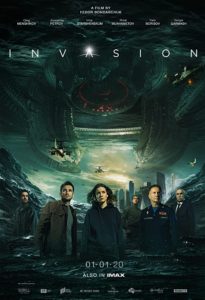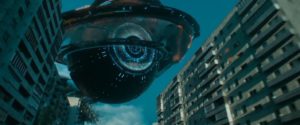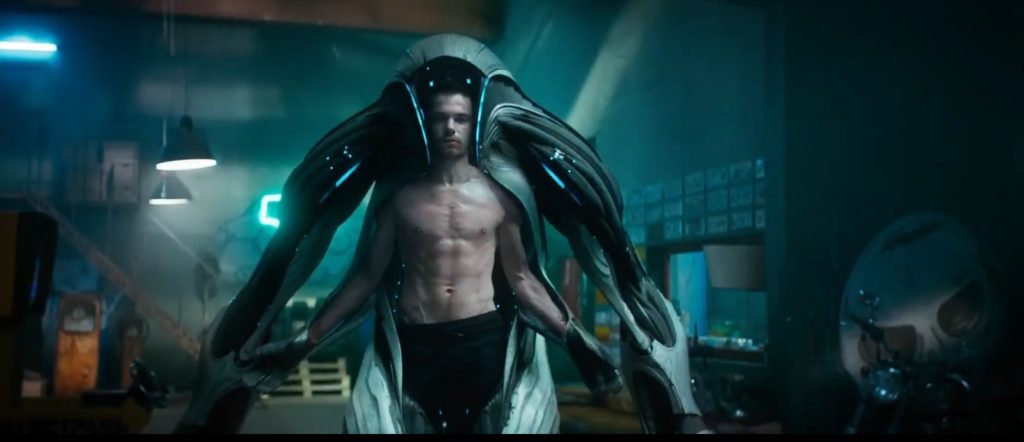Review: “Attraction” and “Invasion”
ET with Russian accent
 When talking about Russian cinema, the first thing that comes to mind are classic movies like “Battleship Potemkin” (“Bronenosets Potemkin”, RUS, 1925), “Solaris” (“Solarys”, RUS, 1972) and “Stalker” (RUS, 1979). Although the Iron Curtain has fallen thirty years ago, it is still difficult the arrival of Russian films in our commercial circuit. Today, thanks to the Internet, we have access to films from all over the world, and from Russia with love we have a finding, in a promotion two for one: “Attraction” (“Prityazhenie”, RUS, 2017) and “Invasion” (“Vtorzhenie”, RUS, 2020).
When talking about Russian cinema, the first thing that comes to mind are classic movies like “Battleship Potemkin” (“Bronenosets Potemkin”, RUS, 1925), “Solaris” (“Solarys”, RUS, 1972) and “Stalker” (RUS, 1979). Although the Iron Curtain has fallen thirty years ago, it is still difficult the arrival of Russian films in our commercial circuit. Today, thanks to the Internet, we have access to films from all over the world, and from Russia with love we have a finding, in a promotion two for one: “Attraction” (“Prityazhenie”, RUS, 2017) and “Invasion” (“Vtorzhenie”, RUS, 2020).
In one of his delusions, the then President Collor classified the cars produced in Brazil as “carts”, and opened the country to import vehicles and other goods. The result was a flood of Russian cars, which appeared to have been shaped with a machete. This was the influence of years of isolation forced by the Cold War, passing on an image of crude and poorly finished products, and also of dubious quality. This happened in the last minutes of the extension of the Soviet Union’s life.
 Three decades later, the Cold War and the Soviet Union are just memories of the past. However, this image of poor and crude products remained, and extended to other sectors, including cinema. This image is reinforced by the influence of American industry, which dominates distribution and makes it difficult to access productions from other parts of the world.
Three decades later, the Cold War and the Soviet Union are just memories of the past. However, this image of poor and crude products remained, and extended to other sectors, including cinema. This image is reinforced by the influence of American industry, which dominates distribution and makes it difficult to access productions from other parts of the world.
With globalization and the internet increasingly fast, today streaming services compete in the market with distributors, and even in the field of productions. Today it is possible to see a series produced by HBO in Cuba, and Russian films produced by Sony, which is the case of those we are going to analyze. And the best part is that the quality is not inferior to any Hollywood production.
 “Attraction”, launched in 2017, explores the old theme of alien invasion with a different perspective. What if the invaders were well-intentioned, and we were the villains? The film deals with an alien spacecraft that is damaged by a meteor shower and falls into a residential neighborhood in Moscow, damaging buildings and killing hundreds of people.
“Attraction”, launched in 2017, explores the old theme of alien invasion with a different perspective. What if the invaders were well-intentioned, and we were the villains? The film deals with an alien spacecraft that is damaged by a meteor shower and falls into a residential neighborhood in Moscow, damaging buildings and killing hundreds of people.
While the military tries to keep the situation under control, in order to establish communication with visitors, groups of residents come together to combat them. Among these are high school student Julia (Irina Starshenbaum) and her boyfriend Tyoma (Alexander Petrov). Julia’s father, Colonel Lebedev (Oleg Menshikov), is the officer in charge of maintaining isolation and communicating with the aliens.
 When the young people infiltrate the isolated area, Julia meets an alien, who ends up saving her life. From there, while her friends are only interested in a strange armor left by the invader, Julia discovers that he is injured and tries to help him, with the support of his geek colleague, Google (Evgenly Mikheev).
When the young people infiltrate the isolated area, Julia meets an alien, who ends up saving her life. From there, while her friends are only interested in a strange armor left by the invader, Julia discovers that he is injured and tries to help him, with the support of his geek colleague, Google (Evgenly Mikheev).
The events rush and a confuse battle takes place next to the spaceship, with an insane Tyoma using the alien armor, while Julia, her father and alien Hakon try to end the conflict.
 An interesting aspect of this movie is the use of the xenophobic sentiment that has been plaguing the world in recent times, used by populist leaders against immigrants and as a way to garner more followers.
An interesting aspect of this movie is the use of the xenophobic sentiment that has been plaguing the world in recent times, used by populist leaders against immigrants and as a way to garner more followers.
Despite not having names known outside Russia, the cast is experienced in movies and TV, and has a great performance, very different from the melodramatic pattern that marks many Slavic productions. Another aspect that stands out is the good use of special effects, both in the alien spaceship and in the battle scenes.
 The end of “Attraction” already suggested that there could be a continuation, which materialized in 2020 with “Invasion”. The story follows with the same characters three years after the events shown in the first film.
The end of “Attraction” already suggested that there could be a continuation, which materialized in 2020 with “Invasion”. The story follows with the same characters three years after the events shown in the first film.
Julia is at the university, and wherever she goes she is surrounded by security guards. This measure is not only due to the fact that his father is now a general, but also because she participates in a research on the artifacts left by the aliens in the first movie. Her ex-boyfriend, Tyoma, also participates in the research, but as a prisoner, because of his past acts.
 The girl suffered some kind of mutation, not only because of the strange bracelet received from the alien, but also when she was saved from death in the spaceship. However, although she realizes that something different is happening inside her, she has no idea what she can do with it.
The girl suffered some kind of mutation, not only because of the strange bracelet received from the alien, but also when she was saved from death in the spaceship. However, although she realizes that something different is happening inside her, she has no idea what she can do with it.
Everything changes when she finds out that the alien she imagined dead is alive, “with address, garden and job”, living in a Moscow suburb. But this encounter also triggers other consequences when RA, the artificial intelligence that controls the extraterrestrial spacecraft, decides to eliminate Julia, due to the potential danger she represents.
 While Lebedev tries to protect his daughter, RA interferes with communications, altering news and even telephone conversations with the aim of killing Julia. As Goebbels & Co well knew, who dominates communications, dominates everything. This time the clash between terrestrials and invaders is close to what we are used to seeing on screens, although the double flood is an original solution that I have never seen before in any fiction movie.
While Lebedev tries to protect his daughter, RA interferes with communications, altering news and even telephone conversations with the aim of killing Julia. As Goebbels & Co well knew, who dominates communications, dominates everything. This time the clash between terrestrials and invaders is close to what we are used to seeing on screens, although the double flood is an original solution that I have never seen before in any fiction movie.
These two films are very interesting, not only because of the different approach from what we are used to by Hollywood standards, but also because they are pieces of entertainment well suited to action movie lovers.






